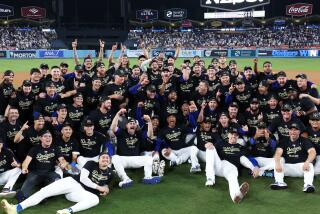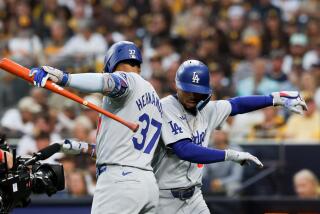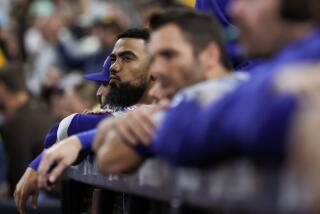After Myers Blows Lead, Padres, Reds Tied in 14th : Baseball: Padres’ 5-1 lead in the ninth in not safe.
- Share via
SAN DIEGO — Nasty? The only thing nasty about Randy Myers on Friday night was his pitching performance as he blew a four-run, ninth-inning Padre lead at San Diego Jack Murphy Stadium.
The Padres recovered, sending the game into the 14th inning with the score 6-6, but only after another rocky outing from the bullpen stopper they acquired during the off-season in a trade for Bip Roberts.
One night after trading jokes with talk show host Dennis Miller, Myers traded in what looked like a certain Padre victory for extra-inning cliff-hanger in front of 22,956.
In fact, the night was ugly for all three of Cincinnati’s former “Nasty Boys,” the nickname the bullpen trio of Myers, Rob Dibble and Norm Charlton earned during the Reds’ 1990 championship season.
Dibble yielded an RBI double in the Padres’ four-run rally in the bottom of the eighth, and, after the Reds took a 6-5 lead in the top of the 11th on Freddie Benavides’ RBI single, Charlton blew the save, allowing Jerald Clark’s game-tying double.
The Padres actually took command after being no-hit for six innings by Cincinnati right-hander Tim Belcher. Myers’ blowing a Harris start is not new. Against the Dodgers on April 12, Myers allowed two inherited runners to score and then let two of his own score as the Dodgers scored four runs in the ninth to tie the game at 4-4. That day, the Padres won it with a run in the bottom of the ninth.
And then in Houston on April 18, in another game started by Harris, Myers yielded a two-run, 10th-inning home run to Jeff Bagwell and the Padres lost, 4-2.
But those days don’t rank even close to what happened Friday night. Harris was lifted for a pinch-hitter in the eighth, while the Padres were taking a 5-1 lead.
Game over, right? Myers came in to close out the Reds.
Right. By the end of the inning, 10 Reds had batted, four had scored, six had hits and the Reds had collected a second opportunity.
It started with a Martinez single. After Chris Sabo forced Martinez at second, Paul O’Neill, Bill Doran and Reggie Sanders followed with singles. Joe Oliver bounced into a fielder’s choice, and Benavides followed with a single.
At this point, with three runs in and the score 5-4, Padre Manager Greg Riddoch walked out to visit with Myers. As the boos flowed, Riddoch decided to leave him in.
Up stepped pinch-hitter Jacob Brumfield, dragging his .250 average with him. He promptly ripped a Myers pitch into right field, allowing pinch-runner Gary Green to score with the tying run.
Riddoch then took his second walk to the mound, and the boos were much louder. He summoned Jose Melendez, and both Myers and Riddoch were booed during separate walks off of the field.
Being that the game involved the Reds, you knew there would be an injury. The crippled Reds were already without stars Barry Larkin, Hal Morris and Glenn Braggs, but this time, for once, misfortune didn’t strike the Reds.
Instead, on a night when second baseman Kurt Stillwell returned to the Padre lineup for the first time since last Saturday, Padre shortstop Tony Fernandez walked off of the field in the first inning--after only two Red batters, with what was described as a mild lower back muscle strain.
Padre trainer Bob Day met Fernandez near the first base line, but Fernandez just shook his head and kept on walking.
Maybe Fernandez just couldn’t bear to watch any more. In the first inning, the Padres threw the ball around with about as much care as your average teen-ager takes with a roll of toilet paper aimed at someone’s tree.
They weren’t sure where it was going.
Which, for a while, helped Roberts ease into his homecoming.
The former Padre was making his first appearance in San Diego Jack Murphy Stadium since being shipped to Cincinnati for Myers last Dec. 9, and he attempted to play if off as just another game.
“(San Diego) is my home,” said Roberts, who still has a house in San Diego. “I just want to do well at home. It’s got nothing to do with the Padres.”
Roberts led off the first with a single and then, on an 0-and-2 pitchout to Martinez, easily stole second when Santiago’s throw sailed way over second and into the waiting glove of Stillwell--who was backing up the play.
Martinez proceeded to strike out, but before Harris even made a pitch to Sabo--the next batter--he whirled and fired to second in an attempt to pick off Roberts.
The ball plunged so far into center field that Roberts scored standing up.
For a while, that was enough. Belcher, whom the Reds obtained from the Dodgers in the Eric Davis trade Nov. 27, retired 18 of the first 19 Padres, walking only Harris. Through six innings, only six Padres hit the ball out of the infield.
Belcher’s earned-run average going into the game (5.68) wasn’t anything special, nor was his record (1-2). But he always seems to give the Padres fits.
Although they beat him on April 8, 2-1, they had to squeeze victory out of only five hits off of Belcher in seven innings.
Although his career record against the Padres is was 5-6 entering the game, his ERA was a tidy 2.34.
The Padres weren’t even in the same area code as a hit until Tony Gwynn led off the seventh. But Gwynn reached out and poked a lazy, high fly to shallow right-center, and neither Sanders, the center fielder, nor O’Neill, the right fielder, could get to it before it hit land.
Not only would Cincinnati not have its first no-hitter since Tom Browning’s perfect game against Los Angeles on Sept. 16, 1988; the Reds didn’t even have a guaranteed victory.
After Gary Sheffield popped to second, home plate umpire Frank Pulli called a balk on Belcher--which Belcher and Red Manager Lou Piniella protested--and then Fred McGriff doubled Gwynn home from second.
Suddenly, it was 1-1.
But for Belcher, the good times were finished. In the eighth inning, the Padres finally figured him out.
It started with Stillwell’s double. Pinch-hitter Oscar Azocar drag-bunted him to third, and Craig Shipley promptly followed with a single to left, giving the Padres a 2-1 lead.
So much for Belcher. Enter Scott Ruskin.
After Gwynn flied to center, Shipley moved to third on Sheffield’s single. Then, Ruskin uncorked a wild pitch, allowing Shipley to score and Sheffield to move to second.
McGriff followed with a single to center, and Sheffield scored.
So much for Ruskin. Enter Dibble.
Benito Santiago followed, and sent Dibble’s first pitch directly toward the left-center field fence. Had it not been for Sanders’ leap, it would have been a home run. But the ball bounced off Sanders’ extended glove--above the fence--and bounced to the ground. Santiago ended up on second, and McGriff scored. It was 5-1, and Belcher’s near-perfect beginning was a distant memory.
More to Read
Go beyond the scoreboard
Get the latest on L.A.'s teams in the daily Sports Report newsletter.
You may occasionally receive promotional content from the Los Angeles Times.










